November 2021 Workshops
Virtual Circle of Support Conference
The Power of Connecting with One Caring Adult
Presented by: Ronnie Sidney, II, LCSW
Watch Ronnie Sidney’s inspiring presentation on the power of one caring adult and what a difference that one person can make in a child’s life.
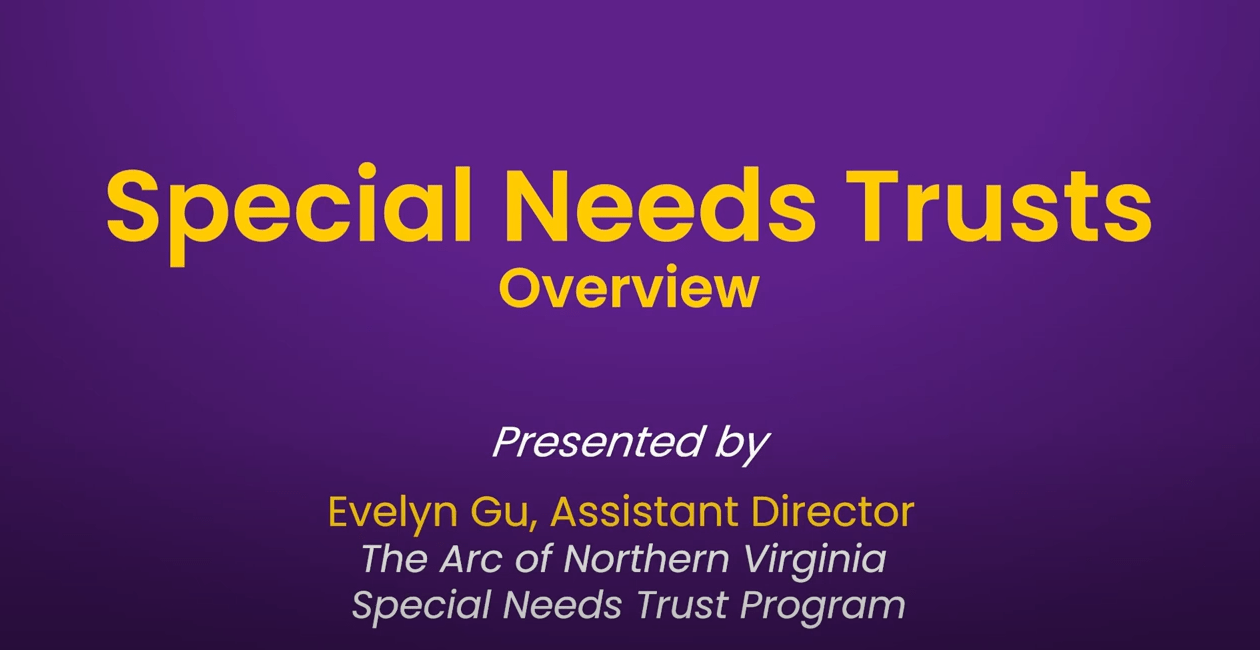
Special Needs Trusts
Presented by: Evelyn Gu
Planning ahead is necessary when wanting to support a person with an intellectual or developmental disability (I/DD) to lead a good life as independently as possible. This presentation will discuss Special Needs Trusts.

Understanding ABLE Accounts
Presented by: Rebecca Lyons
More independence, greater financial security and a better quality of life: that’s the future ABLEnow is building. Join us for this information session to discover the advantages of ABLE accounts and the national ABLEnow program. Rebecca Lyons will answer these questions and more during this session: What are ABLE accounts? Who is eligible? How can I use the money in an ABLE account? What are the features and benefits of the ABLEnow program? How can I learn more and open an account?

Living Independently with Supports
Presented by:Jeannie Cummins
Do you know what “living with supports independently” means? It means that, regardless of the level of communication, physical, medical and behavioral support people need, they can live independently in their own housing with quality services and supports. Join us to learn about the financial assistance programs that make rental housing affordable for people with developmental disabilities, including Housing Choice Vouchers, the State Rental Assistance Program, Virginia’s Low Income Housing Tax Credit programs and Flexible Funding.

Effective Parenting Strategies
Presented by: Dr. James Crist
Let’s face it—parenting is a tough business. Kids don’t come with instruction manuals. And today’s challenges, with the use of cell phones, the Internet, video gaming, social media, and the pressure to succeed at school make it that much harder for parents to figure out if they are too easy or too hard on their kids. Fortunately, there are many parenting techniques that can help. In this talk, Dr. Crist will address why kids misbehave, how disorders can complicate things, the role of incentives and punishment, and how using positive discipline strategies can make home life much calmer.

Who let the ANTs Out?
Presented by: Sonia Hinds, APRN/PMH-BC, RPT-s
Social Anxiety in children is among the most common form of anxiety, a normal reaction to stress. Too much anxiety becomes distress and opens the door to Automatic Negative Thoughts (ANTs), and ultimately panic attacks and other forms of anxiety disorders. This workshop will provide participants with an understanding of anxiety, demonstrating cognitive therapy and directive play interventions for children and adolescents. In the face of COVID-19, a surge of cases of anxiety is expected, requiring creativity and innovation.
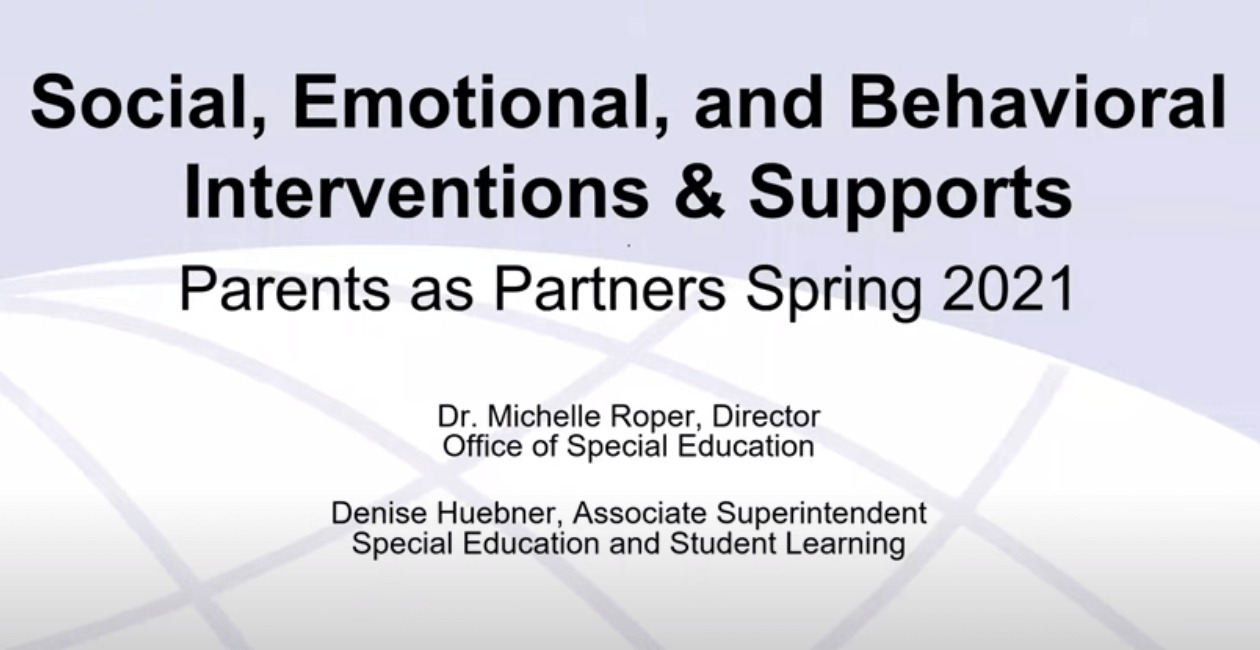
Social, Emotional, & Behavioral Interventions and Supports
Presented by: Charlene Briggs & Jake Fladd, PWCS
This session will provide an overview for parents to better understand Social, Emotional, and Behavioral Learning and its benefits for students and parents. We will share a brief overview of the topic and highlight the many ways that students are supported in our schools when they struggle with emotional and behavioral regulation at school. We also will provide some practical strategies to help students at home. The session also offers helpful resources, including videos, hyperlinks for student interventions, and other supports for parents and teachers alike.
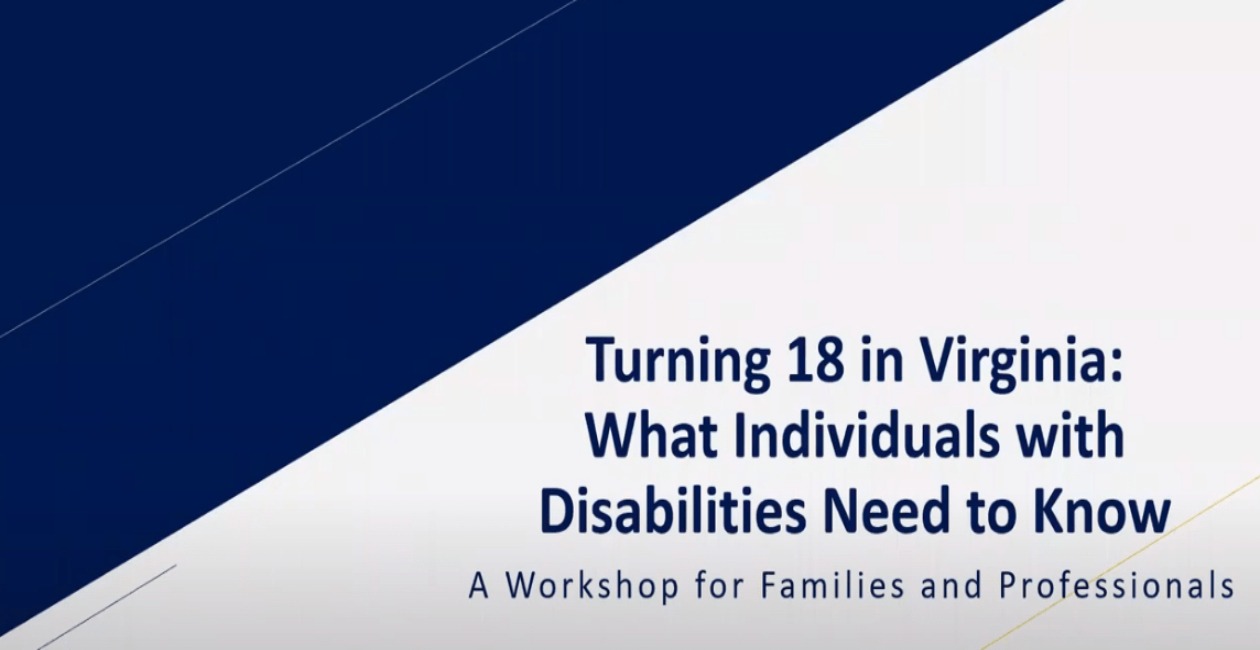
Turning 18 in Virginia
Presented by: Tammy Burns/PEATC
An 18-year-old is legally considered an adult in Virginia. Therefore, when a child turns 18, he/she is the person who makes legal, financial, medical, and educational decisions in his/her life. For some individuals with disabilities, this is not an issue. Others may need support. This workshop will share basic information about things that need to be considered as you or your loved one approaches age 18.
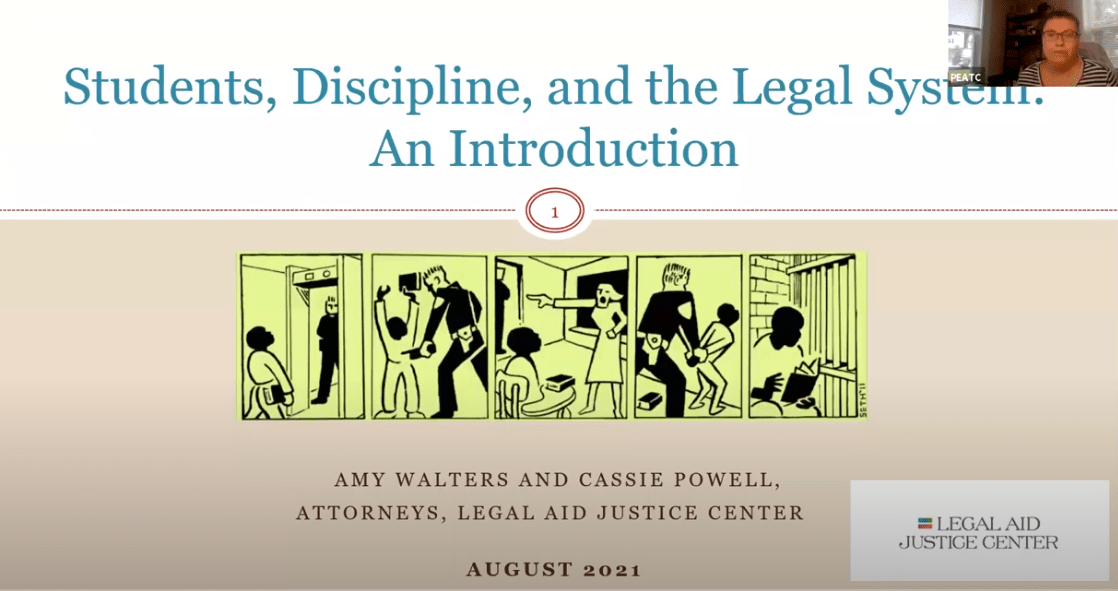
Juvenile Justice in 5 parts
Presented by: PEATC and Legal Aid Justice Center
Select a “Part” to watch the workshops.
Part 1: Students, Discipline, and the Legal System: An Introduction
Part 2: “We regret to inform you …” A Parent’s Role in School Discipline Advocacy
Part 3: Handcuffs in the Hallway: School-based Arrests & Referrals to Law Enforcement
Part 4: Kids in Court: An Overview of the Juvenile Justice System
Part 5: I Still Want to Graduate: Education, Juvenile Detention, and Re-entry

Educational Services for Students Who Are Deaf/Hard of Hearing or Have a Visual Impairment
Presented by: Leslie Parrott, PWCS
This workshop will describe the educational supports and services available to students who are deaf or hard of hearing and students with a visual impairment or blindness. You will also learn how a student would qualify to receive these supports and services.

Explicit Reading Instruction
Presented by: Leslie Parrott, Dawn Gurganious, & Kim Gardziel, PWCS
This presentation will provide an overview of explicit reading programs and supports used to teach reading in Prince William County Public Schools Grades K-12. These programs are research-based and utilize multi-sensory approaches that are beneficial to all types of learners.
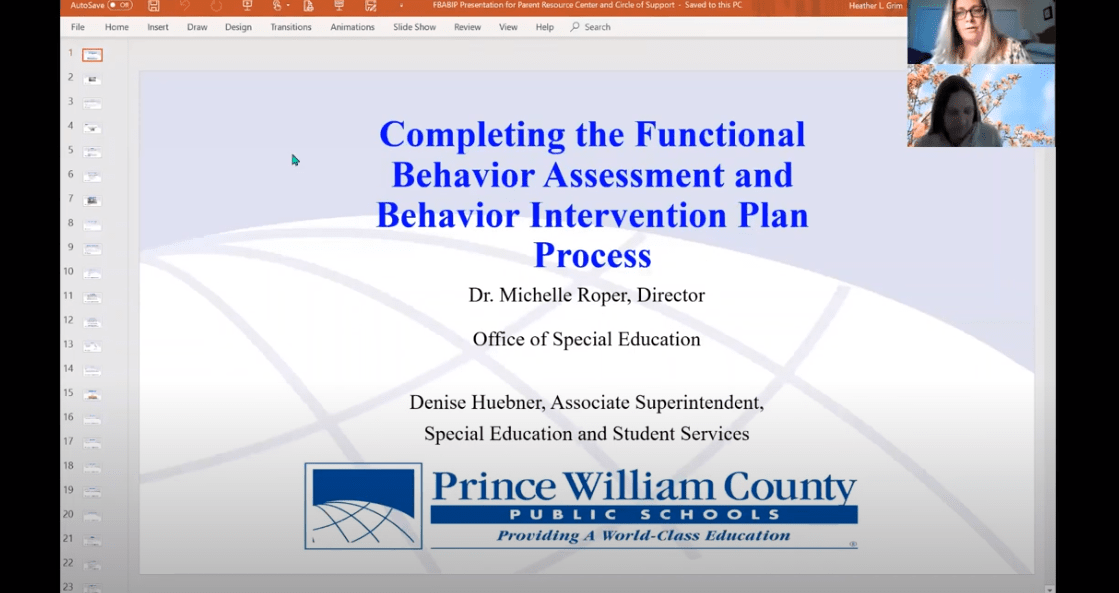
Functional Behavior Assessment & Behavior Intervention Plan
Presented by: Jessica Tra & Heather Grimm, PWCS
The Functional Behavior Assessment (FBA) and the Behavior Intervention Plan (BIP) are formal ways for parents, teachers, and other school professionals to work collaboratively to determine the best way to help a student behaviorally. An overview of the FBA and BIP processes will be presented. Presenters will explain why an FBA/BIP would be appropriate and how this process supports Free Appropriate Public Education (FAPE).

Navigating Transition to Middle School
Presented by:Dr. Ronald Pannell, Cesar Maisonet, & Rozlyn Rodgers, PWCS
The purpose of this workshop is to provide transparency and support to families and community stakeholders for students who are transitioning from elementary school to middle school. Topics include, but are not limited to, the following: school to school communication, the importance of establishing a point of contact, middle school bell and class schedule, physical education, and lockers.

Preschool Special Education- Child Find
Presented by: Kim Legault, PWCS
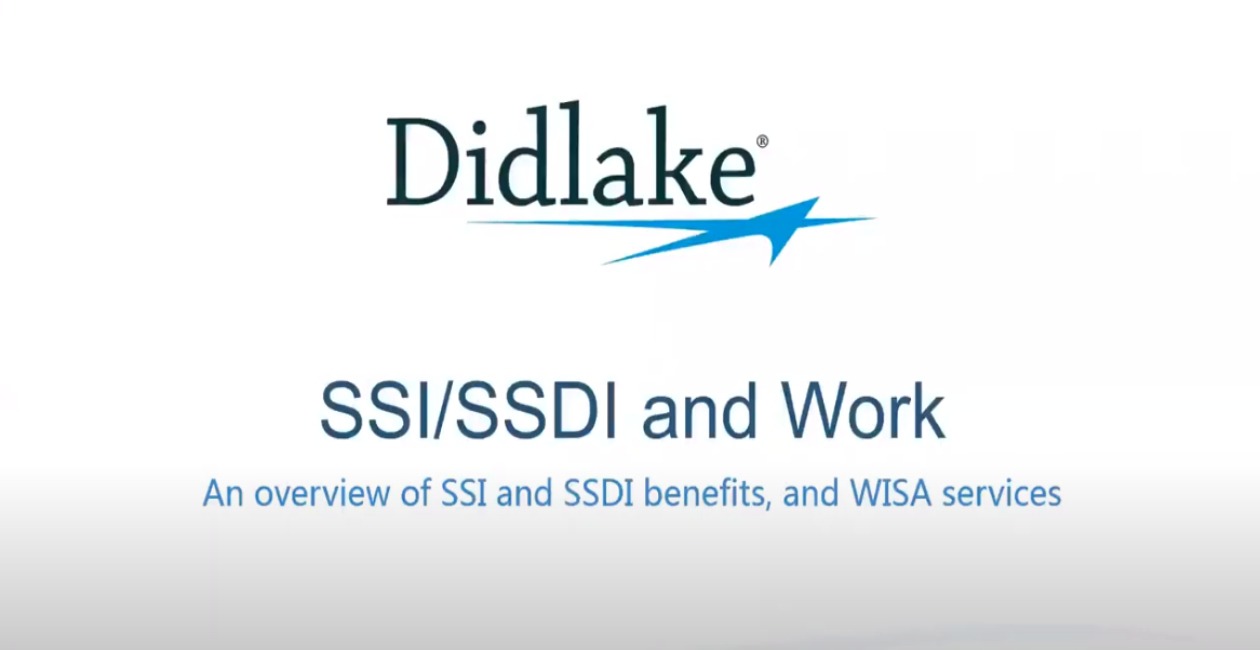
SSI/SSDI and Work
Presented by: Stacy Chapman, Didlake
How working can affect an individual’s SSI or SSDI benefits payments.

Transitioning to High School
Presented by: John Treadwell, PWCS

What Will Life Be Like for My Student After High School?
Presented by: Alana Walmsley PWCS
Does your student have a plan for life after high school? Thoughtful, student-centered postsecondary transition planning will ensure the student’s successful transition from high school to post-secondary roles and activities. This presentation will provide an overview of the process for transition planning through the Individualized Education Program (IEP).
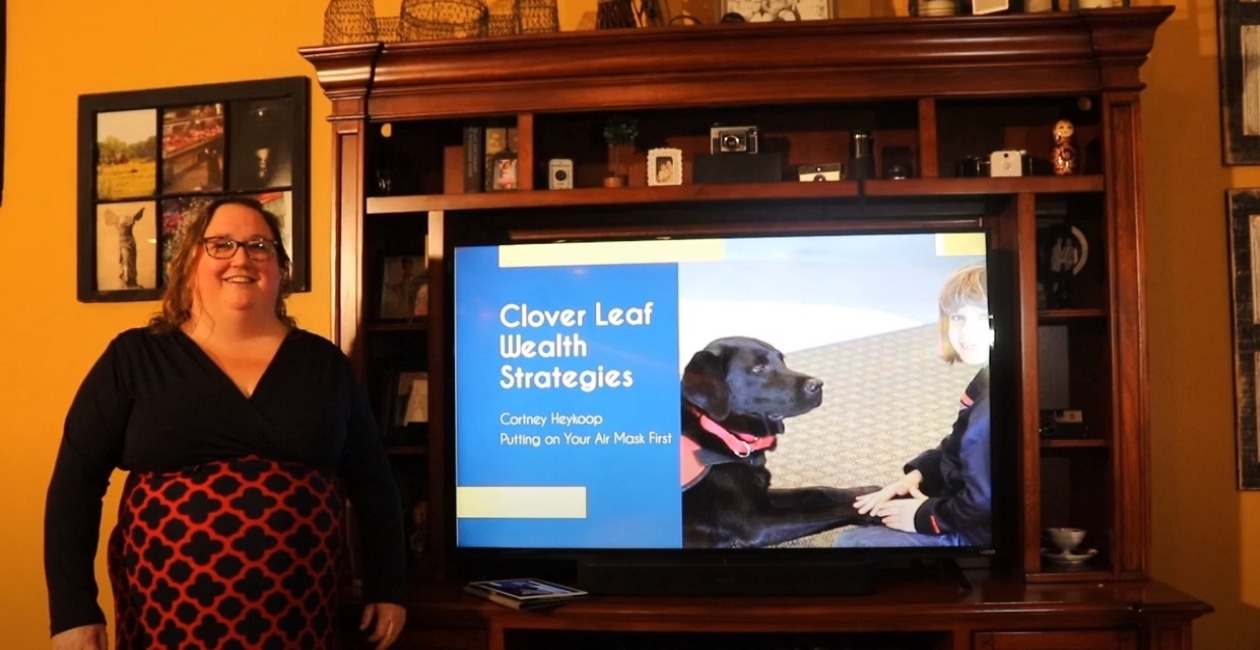
Taking Care of your Financial Plan (Clover Leaf Wealth Strategies)
Presented by:Cortney Heykoop, Clover Leaf Wealth Strategies
Join us as we chat with Cortney Heykoop, Financial Advisor and Chartered Special Needs Consultant. How can you be in the best position to best care for your child into their adulthood? As they say in the safety speech when you board an airplane, you must put your air mask on first before helping those around you. We will review financial planning strategies to prepare for your retirement as well as your child as they transition into adulthood.
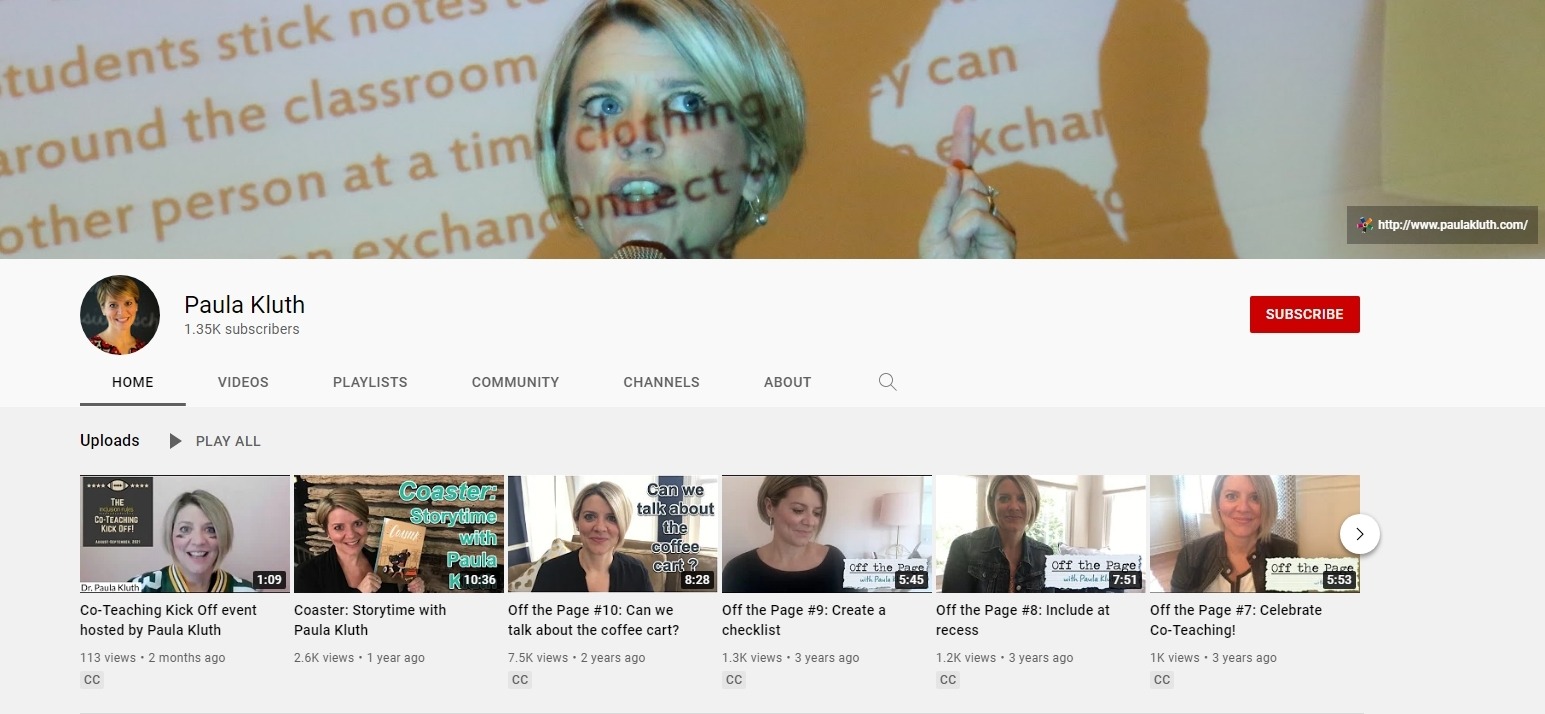
Check out Paula Kluth’s YouTube Page
Resources on inclusion and helpful hints for addressing the complexities of autism.
